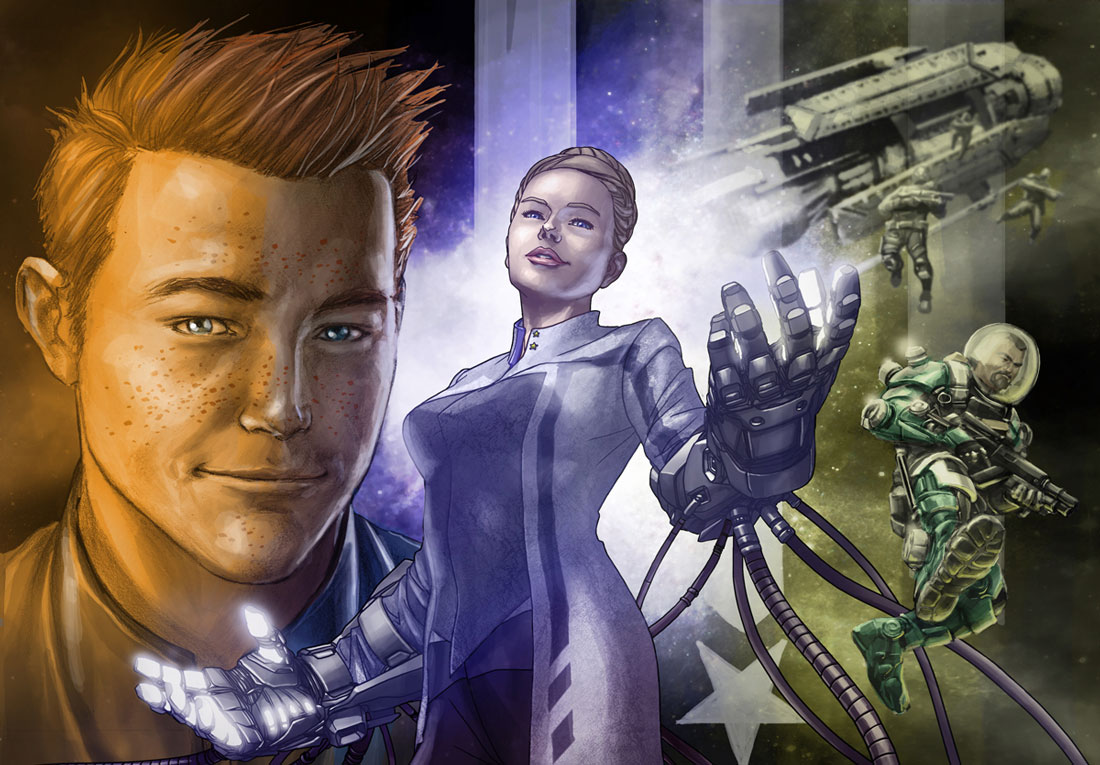
I’ve been following sci-fi author John Scalzi since his first novel (Old Man’s War) debuted back in 2005. He got a lot of favorable and well-earned comparisons to Heinlein (not to mention a Hugo nomination) for that book , which does a lot of things that I like:
- It’s traditional sci-fi. I like the kind of new-wave, literary sci-fi that works with genre-bending and transhumanism and mundane sci-fi (it’s been growing on me), but what initially drew me to sci-fi is simple: the spaceships. There’s just something about going out among the stars that resonates with me on a deep level, and it’s that kind of vintage atmosphere that Old Man’s War hearkens back to.
- It’s conspicuously smart. By sort of revisiting a lot of the tropes of military sci-fi and providing critique, there’s a little intellectual substance to the book. As a quick example, young recruits are told that the aliens who are most similar to humans are actually the worst allies because they will be competing for the same resources. Better to pair up with the gas-giant dwellers and split a solar system than try to maintain an uneasy peace with aliens who would be just at home on an Earth-like planet as we would.
- It’s fun and accessible. Again: I like a lot of relatively inaccessible sci-fi. You know, the kind of stuff that relies on a decent working knowledge of general relativity or that assumes you’re pretty familiar with the standard philosophical canon of sci-fi. But when I envision writing myself, I envision writing something like Ender’s Game or–you guessed it–Old Man’s War that anyone can pick up and dive into.
I’ve been following his career, his blog, and his growing portfolio ever since then and my only solace has been the thought that Scalzi is 12 years older than me. He published his first novel when he was 36. I’ve got a few years. (Actually, my private ambition is a little easier: I’d love to publish my first novel before I turn 41.) Well, that’s obviously not my only solace. He writes good books, and I enjoy reading them. They’re not all on my favorites list, but they’re all solid and demonstrate a good deal of diversity in terms of tone, topic, and structure. The man can obviously write, and it’s worth noting that when his first novel was published he’d already been writing professionally for more than 2 decades.
Me? I’m still waiting for that magical day when I first get paid real cash monies for some words that I arranged. That day has yet to come.
So I’ve been nursing this serious case of Scalzi-envy, and then along comes this article from Polygon talking about his newest project. It’s not really his project, per se. It’s a combination video game / graphic novel being put together by Alex Seropian, who co-founded Bungie, solid it Microsoft, and then founded another studio and sold that to Disney and is now starting from scratch again because hey- that’s how he rolls. Scalzi’s role is to write both the graphic novel (illustrated by Mike Choi) and also the game itself. All of which sounds great, but here’s the line that really poured lemon juice on top of my envy-blister:
For the past year, Scalzi has been hard at work essentially creating a world in which Seropian’s Morning Star and Morning Star Alpha are just small parts.
It’s that phrase “creating a world” that really stood out to me. I love a lot about writing, but the thing I love the most (and the one thing I’m pretty confident that I’m actually very, very good at) is world-building. There’s something intoxicating about applying knowledge from every single discipline that has ever interested me, from linguistics to biology to military history to sociology to psychology to physics, into the task of weaving together a cohesive framework within which narrative, character, and plot can flourish and thrive.

And I’ve got to admit, it’s easy to feel that I’m just hopelessly and permanently out of my league on this one. The combined bios of Scalzi, Choi, and Seropian are impressive, to say the least. I have a hard time finding time to write at all regularly, let alone churn out a novel and get it published.
But I’ll tell you this: I had the evening more or less free today after being scrupulously productive at work all day and I thought about playing video games for an hour as a reward. And then I thought about writing. And you know it? It wasn’t even a contest: writing wins.
The reason I nurture rather than expunge my Scalzi-envy is quite simple and goes back to the tagline of my website. Envy is a terrible motivation, but my dream is to write and I’m sort of willing to take whatever I can get to get there. If envy was my only or primary motivation, that would be both counterproductive and more than a little sad. The target of envy is usually what another person has not what they do, and my fundamental motivation for writing is that I love to write. But in the real world that romantic aspiration has to contend with a grab bag of priorities and responsibilities and excuses, and if it only gets me 90% of the way there: that’s not all the way there. If a little envy can goad me into working one hour more, delaying one more round of video games, or anything else that represents that last 10% or even 1%… I’ll take it.